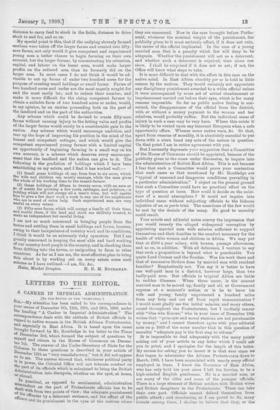CORRESPONDENCE.
THE SMALL HOLDINGS ACT.—DEMAND FOR FIFTY-ACRE FARMS.
(To TOO EDITOR Or TUB "sexarkrott..]
Sin,—In relating two of my farms for Lady Day next I took off each farm fifty acres, and I offered these two fifty-acre lots to the Staffordshire and Shropshire County Councils for the purpose of creating two fifty-acre farms. The land in each case consists of forty acres of permanent pasture and ten acres of arable. The permanent pasture is good dairy land, . making, if skilfully cultivated, a good cheese. The arable land is a rich loam, resting on the red sandstone rock. The water-supply is abundant, the public roade satisfactory, and the excellent inland market town of Market Drayton is about three and a half to three and three-quarter miles distant. I inserted my intentions in three local papers, and asked appli- cants who wished to take these farms under the County Council to send their applications direct to me. At the same time I stated that I would be no party to charity rents, and that the rent in each case had to be fixed at 3i per cent. on the capital value of the land, and that on the cost of the house , and buildings there would have to be charged 3i per cent. per annum, plus 1 per cent, for yearly repairs, and to 1 per cent. per annum sinking fund to replace the buildings at the end of , forty years, when they would probably have to be rebuilt or extensively repaired. In other words, in order to see a clear 3i per cent. on the capital value of the land and the cost of
erecting the house and buildings, the rent of these farms could not amount to less than £110 per annum.
The number and quality of the applicants who have written to me for these farms have exceeded my anticipations. They amount to twenty-three in all,—six from the sons of large
farmers, who wish to begin farming on their own account; ten from men who have been making a success at smaller
places, and now wish to take larger places ; six from men who simply make an application and give no definite particulars about themselves, but state that they are prepared to give mo references which will be in all respects satisfactory ; one from a smart business townsman, who„ has had some experi- ence in practical farming. Judging from the tone of these letters, and from interviews I have had with several of these applicants, I am persuaded that the large majority of them, in practical experience, in sufficiency of capital, and excellence of character, are just the very men to make these farms an economic and social success. If one short letter from me, inserted in three local papers with a circulation limited to our immediate neighbourhood, can call forth such a response, what would be the response if the appeal were made to the nation by the respective County Councils, or, if I might suggest, by the President of the Board of Agriculture ?
It is these fifty-acre dairy farms, with convenient house and buildings attached, that are so much needed, here and there over the country, and for this very good reason : that farms of this size will support a family in decent comfort, provided the land is skilfully treated, the stock bred, selected, and fed, and cared for generally along up-to-date lines, and the produce marketed in a businesslike manner. Farina of this size give the sons of larger farmers, when they wish to get married, a chance of starting a home of their own and of beginning farming on their own account. They also give the cottager who has made a success in a smaller place a chance to take another step up, and to become an independent farmer.
The very difficult question now faces us : From where can suitable land be obtained to create these farms? I have no. hesitation in replying : From the outlying sections of many of the larger farms. There are brilliant exceptions, of course, but my observation, taken from my own estate and from different, parts of the country, has proved to me that when a farm exceeds two hundred acres, while the land round, about the homestead is often well farmed, the outlying sections are often fanned in an inferior manner. There are many reasons why this should so often be the case,—distance to cart manure, distance to carry feed to stock in the fields, distance to drive stock to and fro, and so on.
My special point is this, that if the outlying slovenly farmed sections were taken off the larger farms and created into fifty- acre farms, not only would it give competent and experienced young men a better chance to begin farming on their own account, but the larger farmer, by concentrating his attention, capital, and labour on the lesser area, would make larger profits on the reduced area than he formerly did on the larger area. In most cases I do not think it would be ad- visable to cut up farms of under two hundred acres for the purpose of creating small holdings or small farms. Farms of two hundred acres and under are the most eagerly sought for and the most easily let; and to reduce their number, and make it more difficult for the rising competent farmer to obtain a suitable farm of two hundred acres or under, would, in my opinion, be an unwise proceeding both on the part of the landlord and on the part of the authorities.
Any scheme which could be devised to create fifty-acre farms without causing injury to the letting value and profits of the larger farms would surely be a considerable gain to the nation. Any scheme which would encourage ambition, and rear up the hope of improving his position in the mind of the honest and competent cottager, and which would give the competent experienced young farmer with a limited capital an opportunity of beginning farming in a small way on his own account, is a scheme which deserves every encourage- ment that the landlord and the nation can give to it. The following is the gradation of holdings which I have been establishing on my estate, and I find it has worked well :— (1) Small grass holdings of, say, from four to six acres, which the wife and children can mostly manage, while the man gives the whole of his working time to the tenant-farmer.
(2) Grass holdings of fifteen to twenty acres, with an acre or NO of arable for growing a few roots, cabbages, and potatoes,—a holding which will not occupy all a man's time, but will enable kiin to give a few days' work a week to any one of his neighbours who are in need of extra help. Such experienced men are very useful on every estate.
(3) Fifty-acre farms, which will occupy a family all their time, and enable them, if the land and stock are skilfully treated, to make an independent but careful living.
I am not so much concerned in bringing people from the towns and settling them in small holdings and farms, because, owing to their inexperience of country work and its conditions, I think it would be an extremely risky operation. But I am greatly concerned in keeping the most able and hard-working of our country-bred people in the country, and in checking them from drifting into the towns, or emigrating to farm in other countries. As far as I can see, the most effective plan to bring this about is by working out on every estate some such scheme as I have outlined.—I am, Sir, &c.,













































 Previous page
Previous page